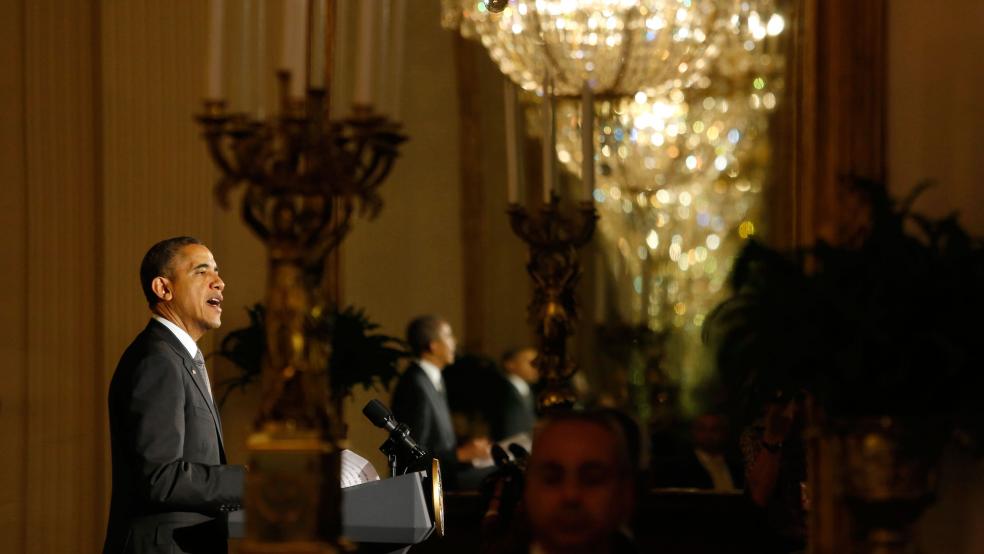President Obama on Wednesday announced that he was removing Russia from a list of countries whose exports receive preferential treatment when entering the U.S. Goods coming from countries that are part of the Generalized System of Preferences are allowed into the U.S. on a duty-free basis in order to “promote economic growth in the developing world,” according to the Office of the U.S. Trade Representative.
In a message to Congress delivered Wednesday, the president wrote, “I have determined that it is appropriate to withdraw Russia's designation as a beneficiary developing country under the GSP program because Russia is sufficiently advanced in economic development and improved in trade competitiveness that continued preferential treatment under the GSP is not warranted.”
Related: Four Reasons Why Putin Pulled Back His Troops
Caitlin Hayden, a spokesperson for the White House National Security Council said that Russia had been scheduled to come off the list in early 2016, but that the president had determined to make the move ahead of schedule. “Russia's actions regarding Ukraine, while not directly related to the president's decision regarding Russia's eligibility for GSP benefits, make it particularly appropriate to take this step now," she said.
While not a crippling blow, trade with the U.S. accounts for a non-trivial 5 percent of Russia’s total exports, according to the Massachusetts Institute of Technology’s Observatory of Economic Complexity.
Russia even has special waivers for specific items – caviar and certain minerals – that would normally be exempt from the preferences because of the size of Russia’s market share.
The move is yet another hit to a Russian economy that is, by all accounts, struggling. In Europe Wednesday, a number of major companies, including the Danish brewer Carlsberg, and the French bank Societe General, reported lower earnings due to problems in the Russian economy.
The news of the change in Russia’s trade status came as confused reports out of Ukraine made the situation in the troubled country unclear. On Wednesday, Russian President Vladimir Putin announced that he had ordered the tens of thousands of Russia troops massed on the border with Ukraine to withdraw. Putin said that they had returned to their regular locations in Russia.
Related: Why the Coming Election in Ukraine Won’t Matter
U.S. officials, however, said that they had seen no such movement. “We’ve seen no change in the Russian force posture along the Ukrainian border,” a Pentagon spokesman told the Associated Press.
In addition to making his claim about troop movements, Putin publicly called on separatists in eastern Ukraine to postpone a controversial referendum on forming their own country. The separatists ultimately want Russia to annex the region, as it did to Ukraine’s Crimean peninsula after invading it last month.
“We believe that the most important thing is to create direct, full-fledged dialogue between the Kiev authorities and representatives of southeast Ukraine,” Putin said. “Because of this, we ask that representatives of southeast Ukraine, supporters of federalization in the country, postpone the May 11 referendum in order to create the necessary conditions for such a dialogue.”
The request seemed to have little immediate effect, as fighting between Ukrainian troops and insurgents who have, in some cases, taken over whole towns, continued. The status of the referendum likewise remained uncertain.
Related: Merkel Could Stub Her Toe Dancing with Two Partners
Observers remained unsure of what to make of the Russian leader’s statements on Wednesday. Putin has said a number of times in the past several weeks that if he believed ethnic Russians were being threatened in Ukraine, he would intervene, leading many to assume he was simply waiting for an excuse to send in his troops.
There is also a strong current of suspicion that Putin may simply be lying. When Russia’s takeover of the Ukraine began, he publicly stated that armed men in insignia-less Russian uniforms were merely members of local militias, only to later admit that Russian troops had been involved in the effort.
In Ukraine right now, the only thing certain is that nobody is really sure what’s going on.
Top Reads from The Fiscal Times:





